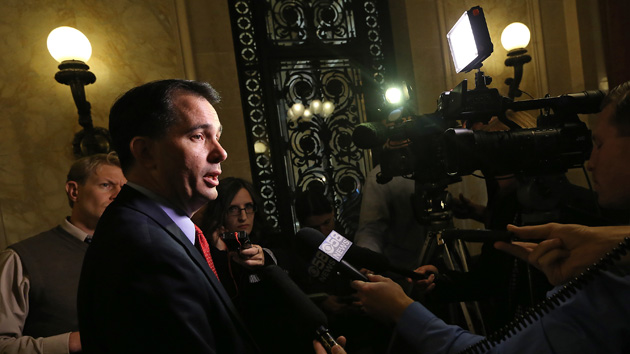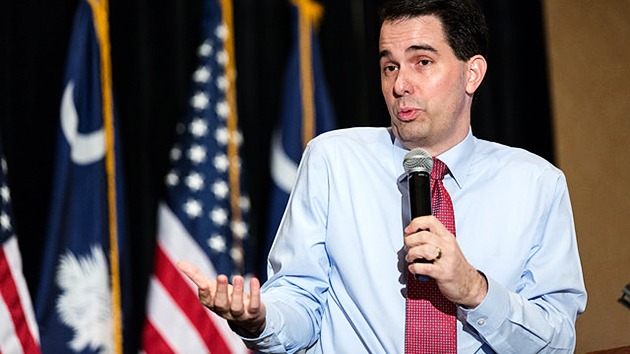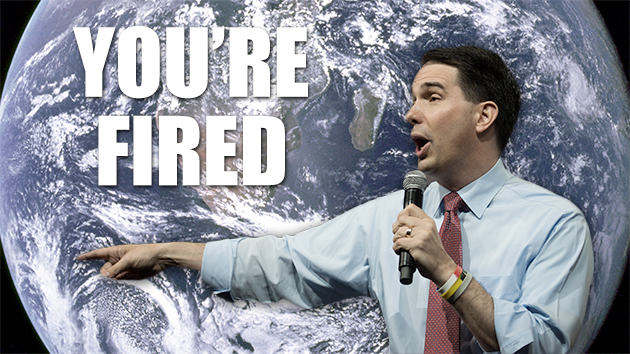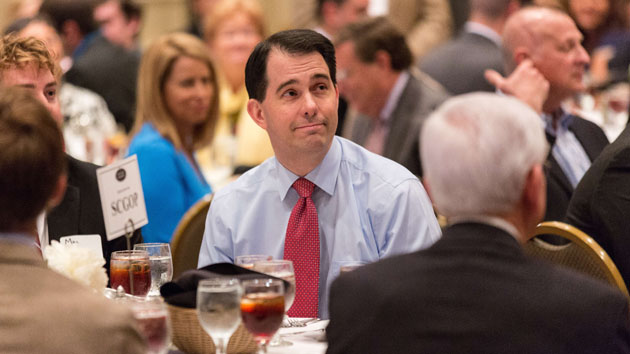
John Hart/AP
For three years, Wisconsin prosecutors have been investigating whether Republican Gov. Scott Walker broke campaign finance laws as he battled a 2012 recall effort sparked by his push for a law that undercut the power of public-sector unions. Prosecutors allege that Walker and his aides illegally coordinated with conservative groups that were raising money and running ads to support Walker and his Republican allies. At least one group at the center of the probe, the Wisconsin Club for Growth, has gone to court to stop the investigation. Its fate now rests with the Wisconsin Supreme Court, which will rule any day now on whether the inquiry can proceed.
But there’s a rub. Two key targets of the investigation—the Wisconsin Club for Growth and Wisconsin Manufacturers & Commerce (WMC), the state’s leading business group—have spent more than $10 million since 2007 to elect a conservative majority to Wisconsin’s top court. Given their involvement in the investigation, and the Wisconsin Club for Growth’s position as a party to the case, good-government advocates question whether the four conservative justices elected with the help of these two groups should be presiding over the case.
The Wisconsin Club for Growth and WMC did not make direct contributions to the campaigns for these justices. Instead, they poured millions into so-called independent issue ads that clearly conveyed messages that supported these campaigns. And in an odd twist, due to lax recusal guidelines—which were adopted at the urging of one of these conservative outfits—these justices on the state’s high court are not compelled to sit out a case involving these two groups.
The Wisconsin Club for Growth and WMC are top players in a years-long undertaking by Walker and his allies to create a conservative majority on the Supreme Court that is friendly to conservative policies—an operation that has included spending millions on ads, ending public campaign financing for Supreme Court elections, rewriting the court’s ethics guidelines, and amending the state’s constitution. This effort has led to one of the most partisan and dysfunctional judicial bodies in the country, a court with liberal and conservative justices who won’t appear together in public. And it could well end up benefiting the conservative groups under investigation should the jurists they helped elect rule the probe should stop.
“This large amount of money and special interests has impacted the workings of the court, the reputation of the court, and how it’s interacting internally,” says former Wisconsin Supreme Court Justice Janine Geske, who served on the court from 1993 to 1998.
The Wisconsin Club for Growth and WMC first began pouring millions into state Supreme Court elections in 2007, when the groups spent an estimated $2.9 million on ads backing conservative candidate Annette Ziegler for an open seat on the Supreme Court and attacking her opponent. Total spending on that election topped $5.8 million, four times the previous record for a Wisconsin Supreme Court race. The following year, the same groups spent more than $2.7 million on ads aimed at unseating sitting Justice Louis Butler, a liberal, and electing conservative candidate Michael Gableman. The election was so nasty that racially-tinged ads released by Gableman’s campaign were compared to the infamous Willie Horton spot from the 1988 presidential election.
The partisanship and massive interest-group spending of the 2007 and 2008 state Supreme Court elections spurred Wisconsin lawmakers to take action. In 2009, the Legislature passed the Impartial Justice Act, setting up a robust campaign finance system for Supreme Court elections, including a matching funds provision to help candidates counter negative ads run against them. But in 2011, Walker quietly repealed the public financing law with language tucked into his first budget as governor.
In the spring of 2011, conservative dark-money groups, which can take in unlimited donations without disclosing where their money comes from, once again poured money into a Supreme Court race in the midst of statewide upheaval over Walker’s Act 10, the anti-union bill that gutted the collective bargaining rights of public-sector unions. As protests over the bill roiled Madison, the reelection campaign of conservative Justice David Prosser became a referendum on Walker’s policies. Prosser’s liberal opponent tried to paint him as a Walker stooge—an easy attack to mount since Prosser’s own campaign manager had touted Prosser as “a common sense complement to both the new [Walker] administration and [GOP-controlled] Legislature.” By the time the April 2011 election arrived, Act 10 was already working its way through the courts and was widely expected to end up before the state Supreme Court. On the eve of the Supreme Court election, Walker’s general counsel at the statehouse urged his friends to vote for Prosser by emphasizing that the fate of Walker’s agenda was on the line. The Wisconsin Club for Growth and WMC spent an estimated $2.5 million backing Prosser through ads, while Prosser’s own campaign spent just $700,000. Ultimately, Prosser won by a slim margin (7,004 votes)—a victory he likely owes to those conservative groups.
Now Prosser and three other state Supreme Court justices elected with millions of dollars in assistance from Wisconsin Club for Growth and WMC are weighing the future of the probe into whether the Walker campaign illegally coordinated with these groups during the recall election (which Walker ultimately won). And the Wisconsin prosecutor leading the investigation believes that this is a significant conflict of interest. In February, he filed a sealed motion asking at least two of the justices to recuse themselves from the case. A heavily redacted copy of that recently unsealed motion raises serious questions about the fitness of at least one justice to participate in the case. That justice, whose name is redacted, is suspected by prosecutors of committing the same type of campaign finance violation that Walker’s recall campaign has been accused of—coordinating its activities with independent groups, possibly the Wisconsin Club for Growth and WMC.
None of the court’s conservative justices have given any indication that they plan to step aside for this case. And, unlike in other jurisdictions, where a conflict of this sort would compel them to remove themselves from the proceedings, they don’t have to. That’s largely thanks to the Wisconsin Supreme Court’s exceedingly permissive recusal guidelines—rules that were written by WMC.
And that’s another curious wrinkle in this tale. In a 2009 case, the US Supreme Court ruled that the right to a fair trial could be violated when a judge presides over a case that involves an individual or group that backed that judge’s election. The decision, Caperton v. Massey, prompted state courts around the country to bring their recusal rules into compliance with that Supreme Court decision. But Wisconsin adopted recusal guidelines at odds with the Caperton decision. The state’s new rules, which were proposed by WMC and then adopted by the court, state that a recusal is not warranted even if an individual or entity involved in a case has donated to the judge’s campaign committee or sponsored an independent issue ad in the justice’s election. That is, a group can spend millions helping a justice win his or her seat and still have that justice preside over a case it is involved in.
“We have clearly a conflict situation with really no guidance with the rules they have adopted,” says Geske, the former justice, referring to the Walker investigation case. “It’s a mess.”
This ethics mess has been accompanied by a series of clashes between the justices that have put the court’s internal dysfunction on public display. The source of the most recent acrimony traces to an effort by Republicans to further consolidate their power within the court by demoting its liberal chief justice, Shirley Abrahamson, so a conservative could run the court. To achieve this, the GOP-controlled state Legislature voted in 2013 and 2015 to amend the state constitution, which stipulated that the court’s most senior justice hold the top post. The GOPers proposed creating a system in which the seven justices elect a chief justice. In April, after WMC spent $600,000 on ads backing the change, voters approved it. (Two votes were required in the Legislature for a constitutional change, before the matter could be put to a referendum.) In short order, the court’s four conservative justices voted in a new chief, conservative Justice Patience Roggensack. In response, Abrahamson sued in federal court to maintain her post for the duration of her term. On Monday, the court’s liberal justices boycotted a ceremony at the state Capitol, refusing to appear in public with their conservative colleagues.
“It’s like watching a slow-moving car wreck,” says Rick Hasen, an election law expert at the University of California-Irvine. “I can’t think of another court where we’ve seen anything like this.”
The dispute over the chief justice spot is only the latest battle between the court’s liberals and conservatives. Many of these skirmishes have involved Prosser. There was the time in 2010 that he called Abrahamson a “total bitch” and threatened to “destroy” her. The next year, Prosser placed his hands around liberal Justice Ann Walsh Bradley’s neck during an argument—an episode that occurred as the Wisconsin Supreme Court was in the midst of ruling on Walker’s anti-union law. In a 2013 letter to the Wisconsin Judicial Commission, Bradley detailed the extra security measures she took because she felt unsafe around Prosser. These moves included requesting police escorts and locking herself in her office when she worked after hours. (Due to a procedural loophole, Prosser was never censured for the chokehold incident.)
It is in this charged climate that the court is now deliberating the Walker investigation. In an unusual move, the conservative justices recently decided to cancel scheduled oral arguments and decide the case without them. “It’s the first time that I know of that the court has taken a case like this and not had oral arguments,” says Geske, calling this decision “concerning.”
The case comes at a delicate time for Walker, as he prepares to launch an expected presidential bid. If the investigation moves forward, it could cast a pall over his campaign. But Walker’s political fortunes are not the only thing on the line. The court’s decision could have major campaign finance ramifications in Wisconsin. If the Supreme Court rules that there is no basis for an investigation, it could signal that coordination is permissible and render “the state’s contribution limits meaningless,” warns Paul S. Ryan, senior counsel at the Campaign Legal Center, a Washington-based group that advocates for tougher campaign finance rules. Nonprofit groups, such as Wisconsin Club for Growth and WMC, can raise and spend unlimited cash and they don’t have to disclose their donors. But there are strict limits and disclosure rules on contributions to political candidates. By coordinating with outside groups, a candidate can skirt both contribution limits and disclosure rules. Should the Wisconsin Supreme Court halt the probe, groups including the Wisconsin Club for Growth and WMC would likely “view it as a green light to continue” coordinating, Ryan says. And that may well help the future electoral prospects of the justices themselves.

















